|
|
|
Sort Order |
|
|
|
Items / Page
|
|
|
|
|
|
|
| Srl | Item |
| 1 |
ID:
132034
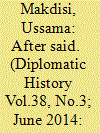

|
|
|
|
|
| Publication |
2014.
|
| Summary/Abstract |
The question of how to represent the U.S. role in the Middle East brings to the fore the question that Edward Said first raised in 1978 in Orientalism about the nature of American understandings of the Middle East. More than three decades after the publication of his book, Said's criticism of Orientalist scholarship-and his accompanying plea for a secular humanistic interpretation to replace it-remain both topical and enigmatic. It is one thing to criticize American representations of foreign cultures; it is an entirely different matter to study American engagements with them. These are by no means unrelated endeavors, but by the same token, they entail very different conceptions of what constitutes a field of inquiry and how to go about studying it comprehensively. The recent emergence of a more critical scholarship of America and the Middle East, therefore, begs the question of whether it is possible to write a history that takes both the Americans and Arabs equally seriously despite the prevailing political climate, and ultimately what kind of methodology this might entail for the rewriting of U.S.-Arab relations, and more broadly, American involvement in the world.
|
|
|
|
|
|
|
|
|
|
|
|
|
|
|
|
| 2 |
ID:
137641
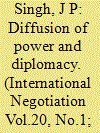

|
|
|
|
|
| Summary/Abstract |
The classic hierarchical distribution of power featuring nation-states is now increasingly supplemented with a diffusion of power with multiple actors. A hierarchical concentration of power is predicated toward bargaining coercion and great powers can impose their solutions on the weak. Diffused power allows for joint problem solving among multiple actors through negotiations but also makes reaching agreement hard because of the relatively greater equality among bargaining units. Reaching agreement in a diffusion of power is also hard because of the new perspectives and meanings that arise through globalized interactions. These new meanings – for example, commerce viewed through the lens of intra-firm rather than inter-country trade – make it hard to fashion solutions based on past understandings centered on territoriality and nation-states
|
|
|
|
|
|
|
|
|
|
|
|
|
|
|
|
| 3 |
ID:
113959
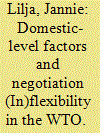

|
|
|
|
|
| Publication |
2012.
|
| Summary/Abstract |
Some suggest that the fault lines of the WTO's perceived failures actually lie in failures at the domestic level. This study examines the factors that can explain flexibility (and inflexibility) in multilateral trade negotiations within WTO member states. To shed light on the role of domestic factors in influencing WTO positions, we examine one member state in connection with a high-level meeting. India at the July 2008 Ministerial is selected primarily for methodological reasons. The empirical analysis provides preliminary support for the proposition that domestic policy-making structures marked by continuous information exchange and coordination are more likely to yield negotiation flexibility in multilateral talks. More specifically, the intense interaction that marks the relationships between actors involved in policy making on Non-Agricultural Market Access (NAMA) and services, where the Indian negotiation position was flexible overall, stands in contrast to what took place in the area of agriculture, where India took a manifestly inflexible stand. Competing explanations fail to fully account for the variation in these negotiating postures. A key insight from the analysis is that organized and regularized consultations, involving the same actors over time, are important. There is also a need for public outreach strategies in connection with high-level WTO meetings.
|
|
|
|
|
|
|
|
|
|
|
|
|
|
|
|
| 4 |
ID:
079901
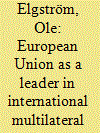

|
|
|
|
|
| Publication |
2007.
|
| Summary/Abstract |
This article analyses the leadership role of the European Union (EU) in international multilateral negotiations. The purpose is to problematize the role of the EU as a multilateral leader by contrasting its self-images as an active initiator with other negotiating actors' perceptions of the Union. This is done by comparing the role conceptions presented by EU representatives with the images presented by delegates from non-member states in three different multilateral negotiating contexts. My results present a picture of the EU as a `restricted leader'. The undisputable great power status that the EU is claimed to hold is not necessarily transformed into a leadership role. The causes vary: in two cases it is internal disunity and co-ordination problems that create obstacles to intellectual leadership; in the third case it is perceived role conflicts that make the EU less than credible in its leadership aspirations. The existing potential for structural leadership is therefore not translated into practice
|
|
|
|
|
|
|
|
|
|
|
|
|
|
|
|
| 5 |
ID:
129810
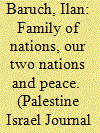

|
|
|
|
|
| Publication |
2014.
|
| Summary/Abstract |
Let me take you for a moment to the negotiations room. There, we see two players silently sitting in front of each other in focused concentration, quietly moving black or white pieces one at a time. The quiet and courteous ambience is deceiving; both are busy contemplating the consequence of defeat.
|
|
|
|
|
|
|
|
|
|
|
|
|
|
|
|
| 6 |
ID:
132027
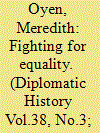

|
|
|
|
|
| Publication |
2014.
|
| Summary/Abstract |
An early battle in the war to gain greater equality for China on the international stage emerged in an unexpected place: Aboard ships around the world sailing for the Allied Merchant Marine. During the Second World War, at least twenty thousand Chinese seamen worked on mostly British ships. Chinese worked long hours, received lower wages than white sailors engaged in the same work, were never given the war risk bonus offered to keep other members of the crew on duty during periods of high risk, and were routinely denied shore leave at U.S. ports on the grounds that they posed a flight risk. In response, Chinese seamen deserted in uniquely high rates, en masse instead of one individual at a time. The nature and scope of the desertions threatened the success of the supply operation, leading the governments involved to come together to try to prevent them.This article explores the multilateral negotiations that endured as long as the war itself. These centered upon three of the most basic inequalities endured by Chinese sailors-unequal pay, lack of war risk bonuses, and lack of shore leave. Using government records from all three parties (the United States, Great Britain, and the Republic of China) as well as press and collections from private organizations, I demonstrate the ways in which racial inequalities ingrained in the international system hindered advances for the Chinese seamen, challenged the smooth management of both Anglo-Chinese and Chinese-American relations, and sparked conflict between the Nationalist Chinese government and the seamen themselves. The legacies of British colonialism in Asia and American exclusion of Chinese combined with wartime public opinion to push forward changes when international union efforts failed.
|
|
|
|
|
|
|
|
|
|
|
|
|
|
|
|
| 7 |
ID:
135247
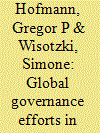

|
|
|
|
|
| Summary/Abstract |
This article focuses on the role of justice claims for issues of global governance. Conflicting justice convictions held by states can become considerable stumbling blocks for multilateral negotiations. Normative claims which call for strengthening individual rights, such as human rights or human security, often collide with statist sovereignty convictions, such as the right of non-intervention, territorial integrity and non-interference. Conflicts between negotiating parties also occur on questions of distribution, recognition and procedural justice. The article argues that such justice conflicts affect the outcome of negotiations. Two recent negotiation processes and governance efforts at the United Nations are examined: the Responsibility to Protect (2005) and the Arms Trade Treaty (2013).
|
|
|
|
|
|
|
|
|
|
|
|
|
|
|
|
| 8 |
ID:
126147
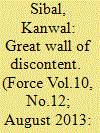

|
|
|
|
|
| Publication |
2013.
|
| Summary/Abstract |
Our relationship with China in the last decade shows features of tensions, mistrust and lack of a solution to some underlying problems coupled with efforts to build confidence, engagement and progress in some areas. In other words, the quality of the relationship has remained largely unchanged. Ties today would be probably a shade worse than they were a decade ago.
|
|
|
|
|
|
|
|
|
|
|
|
|
|
|
|
| 9 |
ID:
132029
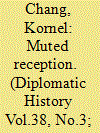

|
|
|
|
|
| Publication |
2014.
|
| Summary/Abstract |
During the Second World War, the United States developed a propaganda apparatus to counter fascist propaganda in Mexico, and later, in Latin America more broadly. Mobilizing the resources and expertise of Hollywood, multinational corporations, and the social sciences, the United States attempted to gauge and sway Mexican popular opinion. This concerted effort at mass persuasion marked the first time that the United States attempted to systematically shape inter-American relations by influencing popular public opinion directly. But this project to inculcate the Mexican masses with U.S. propaganda was marred by difficulties and mishaps that hindered and distorted its transmission. On the other side, Mexicans contested, negotiated, and resisted these overtures, indicating that the influence of U.S. propaganda was neither irresistible nor straightforward. This is a story, then, about U.S. wartime propaganda, how it was developed on the ground and its muted reception in Mexico.
|
|
|
|
|
|
|
|
|
|
|
|
|
|
|
|
| 10 |
ID:
129824
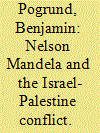

|
|
|
|
|
| Publication |
2014.
|
| Summary/Abstract |
Nelson Mandela's death set off a rush by many in the world to search for lessons in his life, and none have been more eager to do so than Israelis and Palestinians trapped in their conflict. The Importance of Balanced and Compassionate Leadership. The most obvious lesson he offers lies in the critical nature of leadership. After 27 years of imprisonment he emerged into a South Africa torn by violence as the black majority struggled for freedom against a ruling white minority. He quelled the anger among his own people and led them on the path of compromise and reconciliation. His courage and vision earned the respect and support of most whites, which allowed for the rise of a new united South Africa of democracy and non-racism.
|
|
|
|
|
|
|
|
|
|
|
|
|
|
|
|
| 11 |
ID:
129823
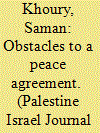

|
|
|
|
|
| Publication |
2014.
|
| Summary/Abstract |
When seriously discussing the fate of the ongoing, everlasting Palestinian-Israeli negotiation, which attempt to reach a peace agreement after decades of conflicts between two people over one historical territory, which I usually refer to as historic Palestine, but which others on the Israeli side may choose to call historic Eretz Israel, analysts are usually face with the dilemma alluded to in the title of this article.
|
|
|
|
|
|
|
|
|
|
|
|
|
|
|
|
| 12 |
ID:
167948
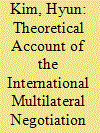

|
|
|
|
|
| Summary/Abstract |
This article aims to explain the multilateral negotiations of the Treaty on the
Prohibition of Nuclear Weapons, which was adopted at the UN General Assembly
on July 7, 2017, from the model of institutional bargaining. Its findings are: first,
non-nuclear states’ sense of frustration and crisis about the failure of progress on
nuclear disarmament under the NPT regime served as a critical momentum to move
towards the negotiations. Second, consensual knowledge about the humanitarian
effects of nuclear weapons and solutions served as a driving force behind
embarking on the negotiations. Third, the leadership by a core group of pro-ban
non-nuclear countries was effective in mobilizing political support and facilitating
the timely conclusion of the negotiations. Fourth, a salient solution of a simple
and robust treaty, and a bridging solution to allow any country in possession of
nuclear weapons to join the treaty before their elimination contributed to the prompt
agreement on the treaty. Fifth, clear and effective compliance measures regarding
non-nuclear states facilitated the conclusion of the negotiations, whereas the lack
of clear and effective compliance measures regarding state parties possessing
nuclear weapons rather contributed to the timely end of the negotiations. Finally, a
fast-track approach, a single-text negotiating strategy, and an issue decomposition
strategy were effective in reaching consensus on the treaty text.
|
|
|
|
|
|
|
|
|
|
|
|
|
|
|
|
|
|
|
|
|